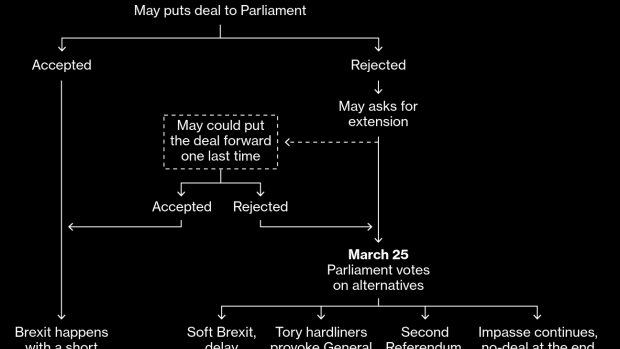Mar 15, 2019
May's Brexit Delay Threat Conceals EU's Dilemma Over Extension
, Bloomberg News

(Bloomberg) -- Theresa May’s government says the European Union could force the U.K. to remain chained to the bloc for more than a year if lawmakers continue to reject her divorce deal. The reality is a bit more complicated.
There’s still no consensus in the bloc as to how long an extension should last, or even how it should be structured. And according to European officials, there’s some concern about the implications of the U.K. taking part in EU elections in May and continuing to have a role in decision-making even as it’s heading for the exit.
The prime minister is still trying to get her deal through Parliament and will have a third attempt early next week. If she fails, the government has pledged to ask the EU for an extension, and says the bloc will probably force Britain into a long one. It’s at least in part a tactic to scare pro-Brexit purists into backing the deal, rather than risk the alternative of a long delay that could end up diluting or even reversing the divorce.
On the EU side, there’s increasing optimism in some quarters that a second referendum could be called. That’s another justification for a longer extension, two EU officials said. Still, there’s no question of making a plebiscite a condition for a delay. Instead, leaders want May to set out a road map for the coming months, such as a schedule for votes in Parliament to work out a U.K. Brexit policy that can win majority support.
EU Council President Donald Tusk, who coordinates the strategy of European leaders, said in a Twitter post on Thursday that he wants government chiefs to be open to a “long extension” if Britain decides to “rethink its Brexit strategy and build consensus around it.”
While several EU officials say in private an extension of about a year is the most likely option, two European officials raised the prospect that a much shorter delay would be agreed to. The EU doesn’t want to be seen to force the U.K. into taking part in European Parliament elections on May 23, which a longer extension would make necessary, he said.
The risk of a short extension is that it creates another cliff-edge just a few months later, and the bloc wants to avoid “serial extensions” every three months.
A possible compromise has also been floated, according to two officials. A delay could be structured around two dates: Britain would be told it has a one-year extension on the condition it holds EU elections by June 30. If May manages to get her deal through Parliament in the extra time, Britain leaves on June 30 and doesn’t hold elections.
If she doesn’t, Britain would have to hold elections and stay for a longer period. This idea would have the effect of creating a new injury-time deadline for lawmakers to get the deal through.
Any request that May makes has to be approved by all 27 EU leaders. They’ll discuss the issue after hearing from the prime minister at an EU summit in Brussels on Thursday.
--With assistance from Gregory Viscusi and Arne Delfs.
To contact the reporters on this story: Ian Wishart in Brussels at iwishart@bloomberg.net;Dara Doyle in Dublin at ddoyle1@bloomberg.net
To contact the editors responsible for this story: Emma Ross-Thomas at erossthomas@bloomberg.net, Dara Doyle
©2019 Bloomberg L.P.







